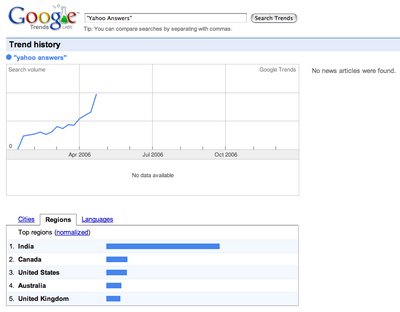Google Answers
Google Answers decides to close up shop – Google Answers is an attempt to create high quality material for knowledge search and a monetisation model at the same time. At the top end, Google Answers looked like consultancy on the cheap. Given the size of the core Google business versus other media opportunities Google Answers was never going to be big. However closing Google Answers seems to be less a criticism of knowledge search and more a broader retrenchment to only focus on ‘Google-sized’ opportunities – effectively ossification of the business.
Design
x0xb0x– amazing improvement by German designers on Roland’s iconic TB-303
How tos
7 tips to save your cell phone battery life
Ideas
Information Arbitrage: The Value of Eyeballs and Its Impact on Journalistic Motivation
The interview: Robert Pirsig | Review | The Observer
Innovation
EETimes.com – Study: Spend more, get more in R&D? Not always
Media
Downloading TV Shows leads to more TV watching at Torrentfreak
I, Cringely . The Pulpit . Declassified | PBS – how Craigslist has affected local and classified advertising business model of newspapers
Boing Boing: Record industry association declares DRM dead
Online
Will Blogs Replace White Papers
paidcontent: Pearson and major business schools pair up for WikiText experiment
GigaOM » YouSendIt Bigger Than We Thought
Monday Morning: First lessons from our Second Life
Twitter: A Whole World in Your Hands
Official Google Blog: Google Base turns 1
Security
NSS Group – Self-described ‘world’s foremost independent security testing organisation’
Schools ban wi-fi networks after safety fears
Software
WordPress Takes On SixApart With Enterprise Edition and WordPress.com
Stellarium – great planetarium programme
Daily Cup of Tech » FreeNAS
PortableApps Suite | PortableApps.com – Portable software for USB drives
